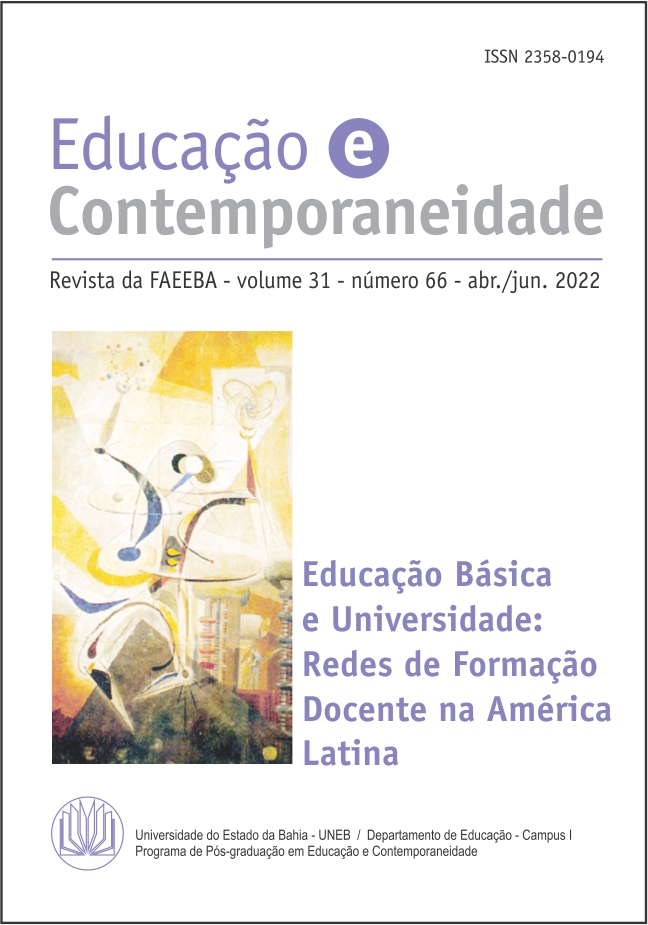Particularities of teachers`academic networks in Colombia
DOI:
https://doi.org/10.21879/faeeba2358-0194.2022.v31.n66.p47-58Keywords:
Academic networks. Workshops. Curricular policy. Research action.Abstract
Academic networks are organizations that can dialogue with government agencies that are looking for academic representatives. These organizations are composed by intellectuals who in the field of education speak out with arguments when policies deviate from the anticipated and agreed horizons. Their dynamics are different according to their origins: when they have a bond with institutional authorities they tend to alter horizons and goals; when they are independent and autonomous, they last over time with the help of research and pedagogical innovations. Independence and autonomy enable critical and creative attitudes towards the decisions of governments in the field of education. Networking is part of the training and self-training of teachers who innovate and do research. The Language Network and the Colombian Association of Mathematic Education are the two most recognized teacher networks in Colombia.
Downloads
References
AGUDO, S.; CABRERA, E.; CHAVARRO, N.; RUIZ, M. Y JURADO, F. Interacción y competencia comunicativa. Bogotá: Universidad Nacional de Colombia,2000.
ARIAS, C.; PACHÓN, T. Y RAMOS, G. Proyectos, memoria y lectura compartida. Bogotá: RedLenguaje, 2021.
DEWEY, J. Cómo pensamos. Barcelona: Paidós, [1910], 1989.
DEWEY, J. Selección de textos. Medellín: Universidad de Antioquia, 2011.
ESPINOSA, S. Hacia la construcción de la lengua escrita en el grado Transición. Bogotá: RedLenguaje, 2020.
JOLIBERT, J. Formar niños productores de textos. Santiago de Chile: Dolmen Ediciones, 1995.
JOLIBERT, J., & SRAIKI, C. Des enfants lecteur et producteur de textes. Paris: Hachette Livre, 2006.
JURADO, F. Investigación, escritura y educación. Bogotá. Universidad Nacional de Colombia, 1997.
KILPATRICK, W. H. The Proyect Method. New York: Teachers College Record, 1918.
MARTÍN BARBERO, J. Saberes hoy: Diseminaciones, competencias y transversalidades. Revista Iberoamericana de Educación. No. 32, 2003. Madrid: OEI
MINISTERIO DE EDUCACIÓN NACIONAL. Ley General de Educación. Bogotá: MEN, 1994.
MIÑANA, C. Y COLECTIVO DE DIRECTIVOS . En un vaivén sin hamaca. La cotidianidad del directivo docente. Bogotá: Universidad Nacional de Colombia, 1999.
MOLINER, M. Diccionario de uso del español. Madrid: Gredos, 1994.
MUÑOZ, M. L.; ROCHA, M.; BARRIOS, C.; CORTÉS, M.; JARAMILLO, D.; Y PAZ, G. Proyectos con-sentidos. Bogotá: RedLenguaje, 2019.
Pertuz, W.; Niebles, O. y Perea, N. (2021). El carnaval como texto: una mirada desde la escuela. Bogotá: RedLenguaje, 2021.
PROGRAMA RED (1996). Memorias del Seminario El lenguaje en la ciencia y en la educación. Bogotá: Universidad Nacional de Colombia, 1996.
PROGRAMA RED . Memorias del Seminario La investigación en la escuela. Bogotá: Universidad Nacional de Colombia,1997.
PROGRAMA RED . La investigación en la escuela. Bogotá: Universidad Nacional de Colombia. Portal redacademica.edu.co, 1998.
REDLENGUAJE . Sobre los aprendizajes fundamentales. Bogotá: RedLenguaje, 2017.
REDLENGUAJE (2019). La pedagogía por proyectos en el Nodo Bogotá de la RedLenguaje. Bogotá: Secretaría de Educación de Bogotá, 2019.
RED LATINOAMERICANA PARA LA TRANSFORMACIÓN DE LA FORMACIÓN DOCENTE EN LENGUAJE. Pedagogía, lenguaje y democracia. Bogotá: RedLenguaje, 2017.
Additional Files
Published
How to Cite
Issue
Section
License
O encaminhamento dos textos para a revista implica a autorização para a publicação.
A aceitação para a publicação implica na cessão de direitos de primeira publicação para a revista.
Os direitos autorais permanecem com os autores.
Após a primeira publicação, os autores têm autorização para a divulgação do trabalho por outros meios (ex.: repositório institucional ou capítulo de livro), desde que citada a fonte completa.
Os autores dos textos assumem que são autores de todo o conteúdo fornecido na submissão e que possuem autorização para uso de conteúdo protegido por direitos autorais reproduzido em sua submissão.
Atualizado em 15/07/2017

















































